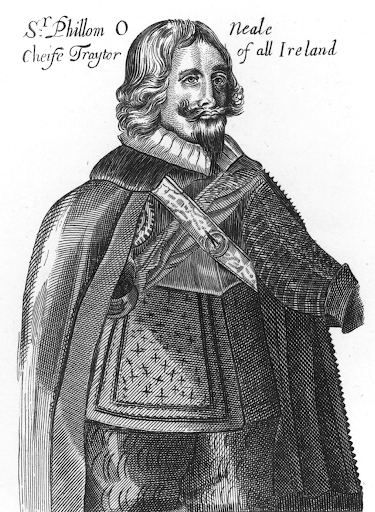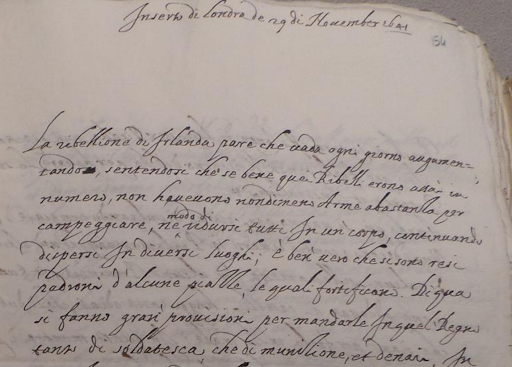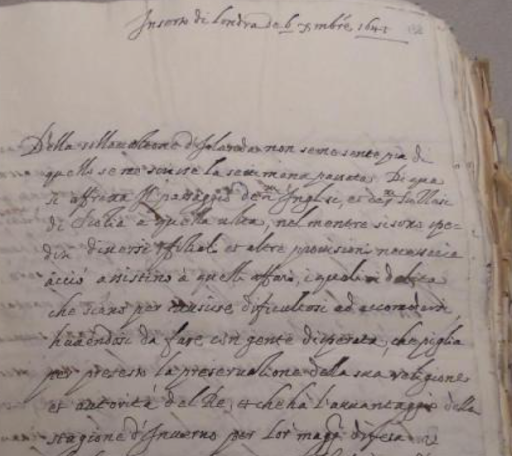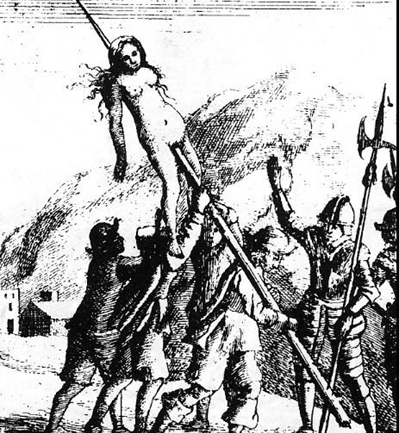[Brendan Dooley]
One year later the First Civil War would begin in England. But already in 1641 simmering tension led to violent conflict between the Irish subjects of the Three Kingdoms, and their authorities, whoever these were conceived to be. Leaders of the 1641 rebellion included Connor Maguire, Roger Moore and Phelim O’Neill.

Phelim O’Neill of Kinard, leader of the Rebellion. https://en.wikipedia.org/wiki/Irish_Rebellion_of_1641#/media/File:Sir_Phelim_O%E2%80%99Neill.png
In the second half of the year attempts to make sense of the current situation found their way into sensationalizing reports in the English press including rumors about atrocities, massacres and assorted violence by Irish Catholics against the Protestants in Ireland.
Salvetti maintains his distance, reporting events with few side comments.

ASFI, MdP vol. 4201, MapID 52957, 154r, London 29 November 1641
| The rebellion in Ireland seems to be increasing every day, and we hear that although those rebels are very numerous, they nevertheless did not have enough weapons to fight with, nor any way of collecting in a single group, as they continue to be spread out in different places; it is very true that they have made themselves masters of some towns, which they are fortifying. Here [in England] many provisions are being made to send soldiers, munitions and money over to that Kingdom, and today the whole Parliament is looking after this with great vigilance and sentiment. The winter season will be somewhat inconvenient for the movement of soldiers, since those seas are very stormy and dangerous, nevertheless they will not fail presently to send 2,000 infantry and 500 cavalry, which along with 5,000 being contributed by the Scots, together with the English troops who are already over there in that Kingdom, will amount in total to about 12,000. It is thought that they will be able to curb and suppress those rebels, or at least prevent them from making progress, and that come Springtime they will make an even greater effort to destroy them. | La ribellione di Irlanda pare che vada ogni giorno augumentando, sentendosi che se bene quei Ribelli erono assai in numero, non havevono nondimeno Arme abastanza per campeggiare, ne modo di ridursi tutti in un corpo, continuando dispersi in diversi luoghi; è ben vero che si sono resi padroni d’alcune piazze, le quali fortificano. Di qua si fan gran provisioni per mandarle in quel Regno tanto di soldatesca, che di munizione, et denari, in questo impiegandosi hoggi tutto questo Parlamento con molta vigilanza et sentimento. La stagione d’inverno per il transito della soldatesca sarà un poco incomoda, siendo quei mari molto tempestosi et pericolosi, con tutto ciò non lascieranno di mandarne di presente da 2 mila fanti et 500 cavalli, che con 5 mila, che gli Scozzesi contribuiscono, insieme con le truppe Inglise che sono già in quel Regno, che in tutto ascenderanno circa a 12 mila si fà conto di potere frenare et supprimere quei Ribelli, o, almeno inperdirli che non faccino progressi, perché a primavera faranno poi maggior sforzo per distruggerli. |
Salvetti adds, “The Earl of Leycester, Viceroy, will soon take over, as he is only waiting for the King’s return, to receive his Patent and instructions.” [“Presto vi passerà il Conte di Leycester ViceRe, non aspettando altro per farlo se non il ritorno del Re, per havere la sua Patente et instruzioni.”]
Leycester was of course supposed to be the successor of the disgraced Thomas Wentworth, Earl of Strafford, arrested by Parliament for excess royalism, and especially for having putatively proposed bringing Catholic soldiers over to England to help the King; but wishing instead to remain in England, James Butler, Earl of Ormond was chosen as viceroy instead.
The following week Salvetti follows up with a comment about the advantages of wintertime for the defending forces:

ASFI, MdP vol. 4201, MapID 52959, 158r, London 6 December 1641
| We hear no more about the Irish uprising than was written about it last week. From here the passage of 2 thousand Englishmen is hastened, and 5 thousand Scots are on their way from Scotland; in the meantime various officers and other necessary provisions have been sent to assist in those affairs, which is doubted will be difficult to accommodate having to do with desperate people, who take as a pretext the persecution of their religion and the authority of the King, and who have the advantage of the winter season for their greater defense. | Della sollevazione d’Irlanda non sene sente più di quello se ne scrisse la settimana passata. Di qua si affretta il passaggio de 2 mila inglesi, et 5 mila Scozzesi di Scozia a quella volta, nel mentre si sono spediti diversi offiziali et altre provisioni necessarie acciò assistino a quelli affari, i quali si dubita che siano per riuscire dificultosi ad accomodarsi havendosi da fare con gente disperata, che piglia per pretesto la presecuzione della sua religione et autorità del Re, et che ha l’avvantaggio della stagione d’inverno per lor maggior difesa. |
Two days after Christmas, a report refers to arrests of Catholics, including clergy.
vol. 4201, fol. 172v-173v, MapID 52989 27 December 1641
| This Irish rebellion here has a very great impact on the poor Catholics, who are now in the worst state they have ever been in. We are currently expecting to see seven clergymen who were condemned to be hanged and quartered last week, according to the wishes of Parliament, despite the fact that the King had wished to save them, and give them to the Ambassador himself, who had asked for mercy. | Questa ribellione d’Irlanda fa qui grandissimo reflesso sopra de poveri cattolici, hoggi in peggior stato che siano mai stati. Si aspetta di momento di vedere condurre al supplizio sette Religiosi, che furno la settimana passata condennati ad essere impiccati et squartati, così havendo in Parlamento stabilito, nonostante che il Re si fusse contenuto di salvarli, et di concederli al Signor Ambasciatore medesimo, che glieli haveva domandati in grazia. |
The same newsletter talks about alleged Catholic atrocities in Ireland, and English efforts to effect religious change.
| Every thought of this Parliament is now directed to the rebellion of Ireland, with every other business abandoned in order to attend to this. The King went there last Tuesday in person to exhort them, and to pressure them to hurry, given that the rebels seemed to be gathering force and approaching the City of Dublin, the metropolis of that Kingdom, committing the most atrocious cruelties on all sides. They are trying to find money for those affairs, in the meantime they have sent a Regiment there with various officers and some sums of money and other provisions, and they will continue like this little by little, until the season for the transit is more suitable as this Parliament is resolved not to grant those people freedom of religion, but rather to force them to observe their religion, or destroy them. | Tutto il pensiero di questo Parlamento, è, hoggi impiegato intorno alla ribellione d’Irlanda, lasciando ogni altro negozio da barda per attendere a questo. Il Re vi andò martedì passato in persona per raccomandarglielo, et per pressarlo di provedervi in tempo, stante che si sentiva che qui ribelli andavano pigliando sempre piedi et accostandosi alla Città di Dublin metropoli di quel Regno, commettendo da ogni parte atrocissime crudeltà. Sono attorno al trovare denari per quelli affari infratanto vi hanno fatto passare un Reggimento con diversi uffiziali et qualche somma di denari et altre provisioni, et così andranno continuando a poco a poco, finché la stagione, per il transito, sia più propria essendo questo Parlamento risoluto di non volere concedere a quella gente libertà di religione, ma se bene forzarli di osservare la loro, o, vero distruggerli. |
In January Salvetti reports that the Irish are ready to hold out until death.
vol. 4201, MapID 52992 10 January 1641
| The uprising in Ireland continues to increase so much that people begin to think that kingdom is in very great danger of being lost. The rebels offer to lay down their arms and retire to their homes, if allowed to observe their Catholic religion, and to depend entirely on the authority of the King, which they claim to sustain, and not on this Parliament, on whom they do not want to depend but rather on their own, and on the laws. Here they do not pay attention to such tolerance of religion, but they absolutely want to force them to submit, which will be a difficult matter, and will bring a lot of blood, seeing in the Rebels an absolute desire to live and die in the Catholic religion, and in the authority of the their King. | La sollevazione d’Irlanda va dimodo augumentando, che si comincia a dubitare, che quel regno sia in grandissimo pericolo di perdersi. Offeriscono i sollevati di deporre le armi et di ritirarsi alle case loro, mentre gli sia concesso l’uso della lor religione cattolica, et che dependino omnivamente dall’autorità del Re, la quale protesta d’ultre mantenere, et non da questo Parlamento, dal quale non vogliono dependere ma si bene dal lor, et sui leggi. Qui non si da orecchie a simile tolleratione di religione, ma si vuole assolutamente forzarli di sottomettersi, il che sarà materia difficultosa, et porterà sangue assai, vedendosi ne Ribelli una assoluta resolutione di volere vivere et morire in mantenimento della religione cattolica, et autorità del lor Re. |
The court audience in Florence, and anyone elsewhere exposed to these newsletters, remained in anxious suspense about what might happen in these circumstances of danger to Church and State. Eventually the Catholic Confederation wins, only to be toppled by Cromwell at the end of the decade.
FURTHER READING
Jane Ohlmeyer, Making Ireland English: the Irish aristocracy in the seventeenth century. New Haven: Yale University Press, 2012
Ireland 1641: Contexts and Reactions, edited by Siochrú, Micheál Ó, and Jane Ohlmeyer, Manchester University Press, 2013.
Ireland 1641: Contexts and Reactions, edited by Siochrú, Micheál Ó, and Jane Ohlmeyer, Manchester University Press, 2013.



